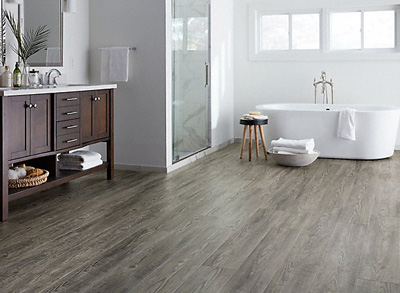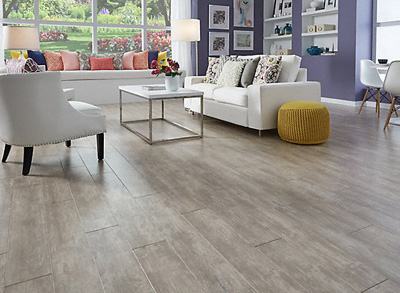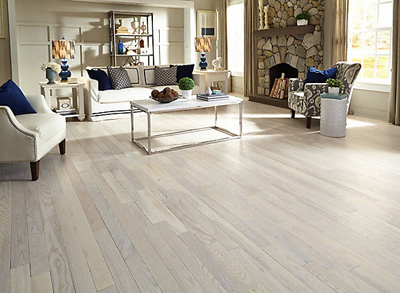Muted Flooring Options for Understated Style
by Rachel Lyon, Editorial Director for The House Designers®
When common flooring choices just don’t do it for you and bold ones are too loud for your liking, perhaps you need something muted. A true neutral, gray flooring has gained many fans in recent years, especially among contemporary designers. With a light and charmingly aged appearance, floors that seem faded by the elements are popular with many homeowners. Whether you want your floor to be strikingly or gently undersaturated, here’s what you should know about muted flooring.
Waterproof and solidly gray,
CoreLuxe Ultra Rocky Coast Pine EVP offers a fantastic base for a bright and simple bathroom. It has beautiful woodgrain detail for a natural look and feel.
Gorgeous Gray Flooring
True gray lies at a far end of the saturation spectrum, devoid of any color. When you choose a totally unsaturated base such as this, the color of every furnishing stands out and seems that much more notable. If you have your eye on bold-hued furniture or accents that you want to be the centerpiece of your design, gray flooring is a fantastic foil to set it off. If you prefer a soft and neutral look, it also pairs well with subtle earthy tones and white, of course. Highly adaptable by nature, a gray floor can support a number of interior styles and gives you plenty of flexibility if you plan to completely overhaul or update your look in the future.
As with any regular wood color, the darker the gray, the more formal its mood and rich its impression. Lighter shades suggest informality and aim to increase the perception of space. No matter which you choose, be sure to balance it with the color of the walls, ceiling, and trim. Many designs stick to grayscale all over so everything else pops, but taupe and subdued colors with gray tones like slate blue and sage green also look good. Homeowners opt for these gentle hues so the whole space is inviting and not quite so arresting at first glance.
Faded Neutral Flooring
Whereas gray is cool, faded wood tones retain their subtle warmth. If you want an adaptable floor with more natural wood charm, this category will deliver with a range of different innately light species and varieties that appear washed out. Products often have beachy names that evoke images of sun, sand, and saltwater, as well as atmospheric descriptors like fog and mist—all things that blanch or obscure color to leave you with softer tones. The possibilities include beige, greige, and cream, and some options include true gray and earthy brown tones for contrast. You’ll be surprised by just how dynamic a faded floor can look!
Faded wood tones are favored by the majority of homeowners who opt for muted flooring because the effect is gentler than gray, which is mostly seen in modern or contemporary homes that are designed to be bold. The subdued look is practically expected in beach houses with their light and airy finishes, but the aesthetic is gaining ground in all types of architecture these days. Muted floors pair well with muted paint colors and provide a backdrop you can use to make furnishings pop, but they can also create beautiful, more traditionally balanced designs.
Consider Other Flooring Characteristics
Color is important, but it’s not everything. In fact, muted flooring actually makes the other characteristics of the boards stand out more. Be sure to look at wood grain patterns and how prominent they are if you’re concerned with subtlety or want to accentuate that natural aspect. Also consider how plank widths affect your space—you can’t really go wrong with traditional standard widths, but wider boards provide extra informal, rustic, or aged personality that many people like. Photography is an awesome resource if you’re interested in seeing this variable in action.
Your entire interior design relies on the base you put beneath it, so take the time to explore a wide variety of floorings to find the perfect one. Lumber Liquidators has a great selection and expert assistance to make the process easier—you can start by checking out their Blue Drift, Driftwood Designs, Salt Washed, Coastal Charm, Gray Gallery, and Black & White collections for beautiful muted flooring options. Of course, in-person help is also available, so find a local store today!



.png)
.png)




